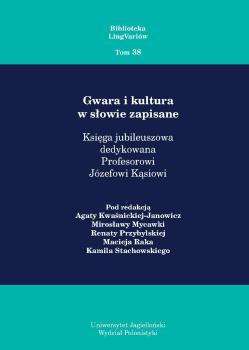Urzinki, bo sie urzino. Motywacja gwarowych nazw słodyczy (na przykładzie materiału śląskiego) .......... 309
Streszczenie
URZINKI, BO SIE URZINO. MOTIVATION OF DIALECTAL NAMES OF SWEETS (USING THE EXAMPLE OF MATERIAL FROM SILESIA)
The subject of the present paper falls within the area of culinary studies in a broad sense. It aims to discuss dialectal names of sweets and to examine the semantic motivation behind these names. The foundation for the observations made in the paper consists of 78 culinary terms extracted from Lidia Przymuszała and Dorota Świtała-Trybek’s Leksykon dziedzictwa kulinarnego Śląska [‘A lexicon of the culinary heritage of Silesia’]. The analysis of the material revealed that the main factors underlying the semantic motivation of dialectal names of sweets include: the primary ingredient of the dish/product ( jabłecznik [‘apple cake’], makownik [‘poppy seed cake’], śliwczok [‘plum cake’]), additional ingredients (anyżki [‘anise-flavoured sweets’], zozworki [‘ginger-flavoured sweets’]), the absence of a certain ingredient (kołacz prosty [‘plain cake’], bidakuchen [‘poor cake’]), various methods of preparation of the dish (szulka [‘cinnamon-flavoured horn’], topielec [lit. ‘drowned man’], urzinki [lit. ‘cuttings’]), its organoleptic properties such as appearance (colour: białe pierniki [‘white gingerbread’], and shape: kamyczki [lit. ‘stones’], kopki [lit. ‘small heaps’], kulki [lit. ‘balls’]), sound (chrust [lit. ‘brushwood’], chrustki, chruściki), consistency (ciaplyta [lit. ‘goo’]), as well as temporal-occasional factors (martiny [lit. ‘St. Martin’], nowoletniki [lit. ‘new year’], radośnik [lit. ‘happy’]) or indicating the connection of the dish to a specific region, city or country (kopa ornontowicka [‘Ornontowice cake’], ciasteczka cieszyńskie [‘Cieszyn cookies’], kołacz pruski [‘Prussian cake’]).





